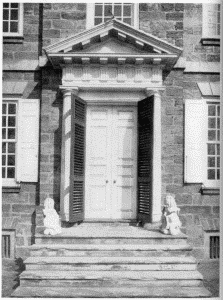| Note from the producer of this etext: A larger version of any of the images may be viewedby clicking directly on the image. |
The Colonial Architecture
of Philadelphia
Nine hundred and seventy-five copies of The Colonial Architecture ofPhiladelphia, of which nine hundred and fifty are for sale, have beenprinted from type and the type distributed.
This copy is Number 201
The
Colonial Architecture
of Philadelphia
By
Frank Cousins and Phil M. Riley
Illustrated

Boston
Little, Brown, and Company
1920
Copyright, 1920,
By Little, Brown, and Company.
All rights reserved
Foreword
So many books have been published which are devoted wholly or in part tothe fine old Colonial residences and public buildings of Philadelphia,including Germantown, that it might seem almost the part of temerity tosuppose there could be a place for another one. A survey of the entirelist, however, discloses the fact that almost without exception thesebooks are devoted primarily to a picture of the city in Colonial times,to the stories of its old houses and other buildings now remaining, orto an account of the activities of those who peopled them from one totwo centuries ago. Some more or less complete description of thestructures mentioned has occasionally been included, to be sure, butalmost invariably this has been subordinate to the main theme. Thenarrative has been woven upon a historical rather than an architecturalbackground, so that these books appeal to the tourist, historian andantiquary rather than to the architect, student and prospective homebuilder.
Interesting as was the provincial life of this community; absorbing asare the reminiscences attaching to its well-known early buildings;important asvi were the activities of those who made them part and parcelof our national life, the Colonial architecture of this vicinity is initself a priceless heritage—extensive, meritorious, substantial,distinctive. It is a heritage not only of local but of nationalinterest, deserving detailed description, analysis and comparison in abook which includes historic facts only to lend true local color andimpart human interest to the narrative, to indicate the sources ofaffluence and culture which aided so materially in developing thisarchitecture, and to describe the life and manners of the time whichdetermined its design and arrangement. Such a book the authors havesought to make the present volume, and both Mr. Riley in
